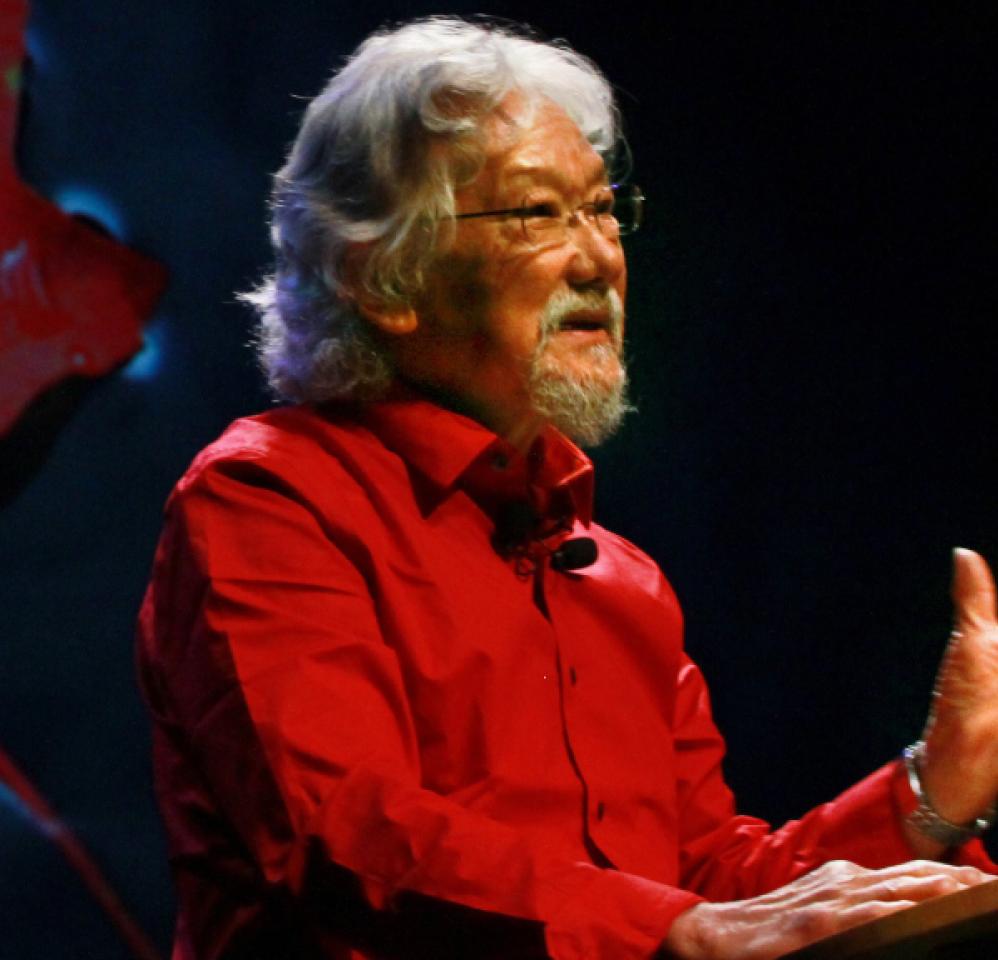
The Last Word
David Suzuki
Q: If you could invent something, what would it be?
A: Nature already did it - photosynthesis.
There is really no need to caption his photo or provide a bio. The much-decorated David Suzuki has been part of the fabric of Canada for decades – a presence on bookshelves, a familiar face on TV screens, a popular educator, and a passionate, in-your-face environmental activist who regularly reminds us that we are all accountable for the current and future state of our planet.
But you already know all this. What you might not know about David Suzuki is that he is partly responsible for the establishment of UBC’s first pub (in itself deserving of an award). Back in October 1968, UBC Reports carried an article by Suzuki entitled “What this Campus Needs is a Pub.” The young professor had already been conducting some of his seminars in the Fraser Arms, so a pub on campus was the logical next step.
He argued that such an establishment would break down barriers between various UBC populations and prevent the campus becoming a ghost town once classes were finished for the day. “In a campus pub,” he opined, “the presence of friends at different tables and the warmth of camaraderie engendered by beer would soon result in new friendships and active discussion.”
Because the article was published in the same month that UBC students – emboldened by US counterculturalist Jerry Rubin – invaded the faculty club for an overnight sit-in, Suzuki felt it shrewd to point out another advantage of beer: “The passions of reactionary or radical ideals would be tempered by the effects of alcohol,” he wrote, somewhat unconvincingly. The AMS, at least, were impressed, and invited Suzuki to join their pub committee. “The Pit” opened that November, and it was Suzuki who came up with the name.
All this happened before he became a household name by venturing into broadcasting (he has hosted CBC’s The Nature of Things since 1979), and through the environmental protection work of his eponymous foundation. During the 40 years he has been in the public eye, Suzuki has attracted both disciples and detractors (the controversy over his honorary degree from the University of Alberta being a recent example – he is not a fan of the oil industry), but, judging from a series of polls, the latter group are outnumbered. In 2004, CBC viewers voted him the fifth greatest Canadian ever. In 2009, 2010, and 2011, he topped a Reader’s Digest poll to determine the most trusted Canadian. Two years later, an Angus Reid poll crowned him Canada’s most admired figure (although it’s interesting to note that, broken down by regional vote, Alberta wasn’t as admiring as other areas of the country). And, although he retired from UBC in 2001, there are still a couple of reviews for him on the notorious Rate My Professors website – where students openly assess professorial performance, often without mercy. Both reviewers scored Dr. Suzuki five out of five (with a chili-pepper icon thrown in to denote hotness).
What is your most prized possession?
Memories.
Who was your childhood hero?
My father. He still is.
Describe the place you most like to spend time.
Vancouver, where I’ve lived in the same house for over 43 years.
What was the last thing you read?
Doughnut Economics by Kate Raworth
What or who makes you laugh out loud?
My grandchildren.
What’s the most important lesson you ever learned?
I’m only one person, and the way to bring about change is to create a movement.
What’s your idea of the perfect day?
Waking beside my wife at our cottage, and going down to the ocean with a grandson to catch breakfast, which we clean and cook while others get up. That’s the start of the perfect day.
What was your nickname at school?
I’ve always been called “Dave,” until I came to UBC in the 1960s.
What would be the title of your biography?
He Did His Best
If a genie granted you one wish, what would it be?
To live long enough to see my last grandchild graduate from high school.
What item have you owned for the longest time?
I guess photographs from my parents.
Whom do you most admire (living or dead) and why?
Nelson Mandela, who never lost sight of his goal, even after bearing terrible atrocities and imprisonment for the prime of his life, and then achieving not only the end of apartheid but becoming president of South Africa, without wreaking havoc against his tormentors. He set a very high bar.
What would you like your epitaph to say?
“He was just a man, but he tried his best.”
If you could invent something, what would it be?
Nature already did it: photosynthesis.
In which era would you most like to have lived, and why?
I lived through it – a time of incredible opulence when we confront the reality that, if we don’t change radically, our species might not make it to the end of the century.
What are you afraid of?
Foresight was our species’ great advantage, yet today, with all the amplified foresight of scientists and supercomputers, we ignore them for political and economic reasons.
What is your latest purchase?
If you mean big-ticket item, an electric car.
Name the skill or talent you would most like to have.
Playing a musical instrument.
What is your pet peeve?
Hypocrisy.
What is the secret to a good life?
It’s no secret. A good life is family and friends and the things we do together.
Do you have a personal motto?
You are what you do, not what you say.
What are your UBC highlights?
Having a lab of keen students and associates doing research on fruit flies.































